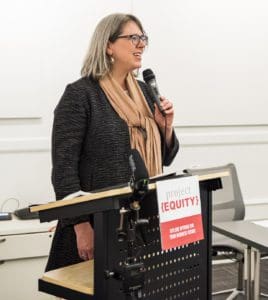Opportunities abound to advance employee ownership through federal and state policy
Over the next decade, engaging and activating policymakers to advance employee ownership will be key to addressing income, wealth and racial inequality at scale. The COVID-19 pandemic has exacerbated inequities and elevated the urgency to pursue systemic change. Fortunately, many government leaders are presently receptive to new or under-utilized solutions such as employee ownership.
Project Equity and allies across the employee ownership field recognize this unique moment and as such have accelerated policy and government engagement efforts.
 At the federal level especially, we see significant momentum and opportunities to advance employee ownership. SBA Administrator Isabel Guzman, Labor Secretary Marty Walsh and Deputy Labor Secretary Julie Su are known supporters of employee ownership. The newly revived State Small Business Credit Initiative (SSBCI) also includes recommendations for states to support employee ownership centers that provide technical assistance, and the revival could even catalyze states to create SSBCI-related programs that raise and deploy capital to finance employee ownership transitions.
At the federal level especially, we see significant momentum and opportunities to advance employee ownership. SBA Administrator Isabel Guzman, Labor Secretary Marty Walsh and Deputy Labor Secretary Julie Su are known supporters of employee ownership. The newly revived State Small Business Credit Initiative (SSBCI) also includes recommendations for states to support employee ownership centers that provide technical assistance, and the revival could even catalyze states to create SSBCI-related programs that raise and deploy capital to finance employee ownership transitions.
Multiple bills have been proposed to congress in recent months that would significantly advance employee ownership:
- The bipartisan Moran-Sanders amendment to Senate Bill 1260 would have provided $50MM over four years in funding for state-hosted or state-funded employee ownership centers. Though not adopted into the Senate bill, it is expected to be revived when the House of Representatives takes up similar issues in the fall.
- The Capital for Cooperatives Act was recently introduced by Senator Hickenlooper, who is seeking co-sponsor champions for this critical intervention to level the playing field for cooperatives in the SBA’s primary loan program.
- Senators Benjamin Cardin and Rob Portman have recently introduced the Promotion of Private Employee Ownership Act, meant to lift barriers to growth for the ESOP sector by providing additional TA and capital gains tax deferral opportunities.
- Recently, Rep. Adam Smith and Sen. Klobuchar announced plans to introduce the Emergency Economic Workforce Resiliency Act, with a special funding stream for state and local workforce boards to assist firms in transitioning to employee ownership or worker cooperative models.
State level advocacy and policy change are also important for catalyzing the field’s growth. We see a great deal of overlap in state and federal strategies, and the following shared policy goals inform our efforts at both levels:
- Raising awareness about employee ownership
- Expanding expert technical assistance programs to serve businesses
- Removing barriers to capital access for cooperative businesses and employee-owned companies
In California, for example, Project Equity has been co-leading a multi-organization coalition formed in spring 2020: the Worker-Owned Recovery California Coalition, or WORC. Our partners in this work include Certified EO, Sustainable Economies Law Center, Democracy at Work Institute, SEIU-UHW, and several others, and the coalition is actively seeking new members. WORC is directly engaging lawmakers and raising awareness of the need and opportunity for broad-based employee ownership as a recovery strategy, having conducted almost 100 one-on-one meetings with lawmakers, agency and committee staff, and staff from the Governor’s Office.
We know that employee ownership can help us build back with more resiliency—we knew it from past recessions, and employee-owned firms delivered an even greater positive impact for workers and communities during the current pandemic. Federal and state policy can help significantly grow employee ownership while addressing the “twin crises” of the silver tsunami of retiring business owners and the economic fallout of COVID-19.
We urge you to join us in leaning into this moment of policy need and opportunity. Some of the ways that Project Equity is doing so include:
- We recently forged a partnership with The ESOP Association, the leading lobbying group for ESOPs, to bring information about business retention through employee ownership to policymakers in Washington, D.C.
- Co-founder Hilary Abell was appointed a fellow with the Washington DC-based think tank Progressive Policy Institute, providing opportunities for her to educate federal policymakers about employee ownership.
- Co-founder Alison Lingane, through her capacity as an Aspen Institute Job Quality Fellow, developed employee ownership policy recommendations for the Biden Administration as part of The Aspen Institute’s Job Quality Agenda.
Our team is excited to join these and partners in working on employee ownership policy and to bring a unique perspective based in our hands-on work transitioning businesses to employee ownership, training employee-owners, and partnering with local governments and other stakeholders.
